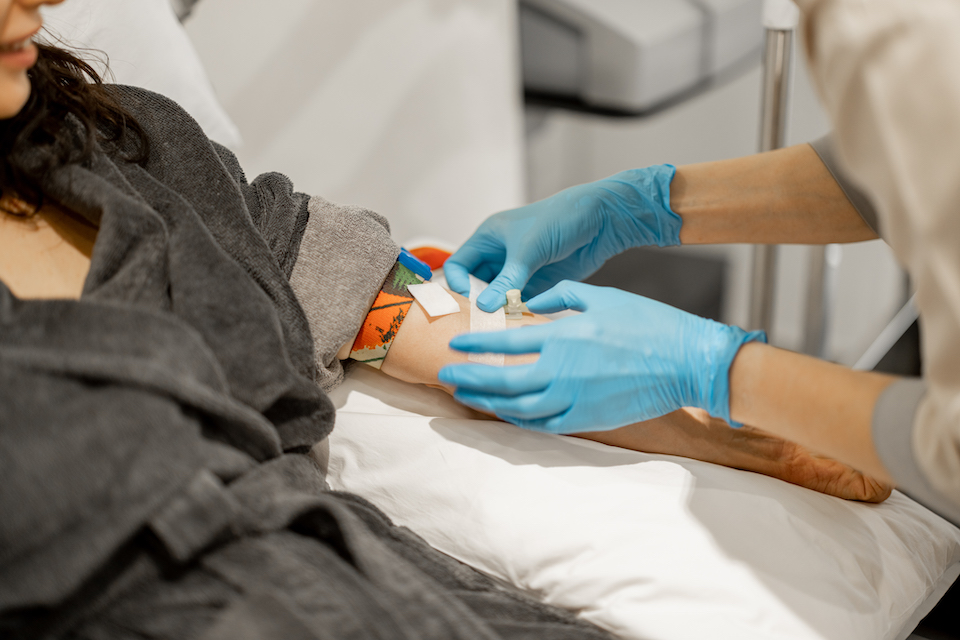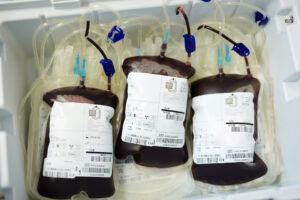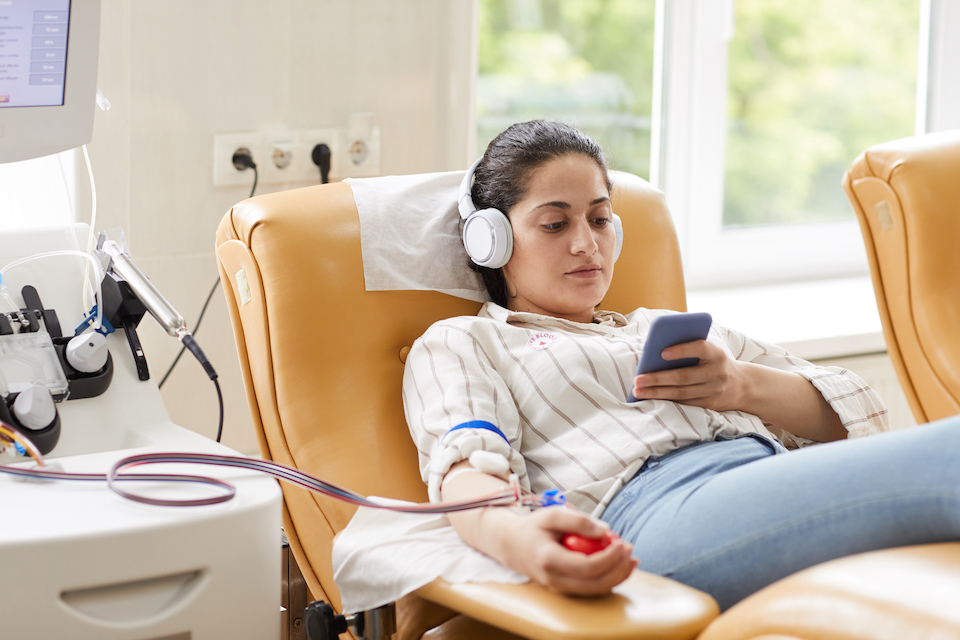
Blood is something we all need. As co-leader of the Civil Service Blood Drive, Joe Smith is on a mission to persuade civil servants to take time out of their day to donate blood and help a stranger.
The COVID-19 pandemic has affected our world in a myriad of different ways. We are more cautious than we were before, the nation now has lengthy backlogs in medical care and the judicial system, and supply chains have been stretched as demand has switched back on. Yet lockdown measures are still in place in some parts of the world.
All this has made me think about what I can do to help others who are less fortunate than me. Not in financial terms, but in the pure sense of the word, those who suffer bad fortune, people who are simply struck with bad luck. And any one of us, no matter our circumstances, can be struck by bad luck at any time, as can our loved ones.

That's why I give blood.
Emerging from lockdown, we are all more aware of the risks we take in our daily lives, with our health, even with our journeys to work. All it takes is to be struck by poor fortune, as we all are from time to time, to put us in the unpleasant position of needing a blood transfusion.
The fact is, blood stocks are incredibly low right now, yet millions of people every year depend on emergency blood transfusions for care in A&E, as well as those undergoing routine operations and regular treatment. According to NHS Blood and Transplant, around 135,000 new donors are needed every year in England to ensure demand can be met. It’s needed more than ever.
If blood stocks fall further then routine operations will not be possible. However, your positive decision to become a blood donor does not depend on luck. By spending a small amount of time and energy (and incurring minor discomfort), you can help make sure blood stocks remain at reliable levels.
If enough of us do this, then our families who are unfortunate enough to have an accident or to experience a deterioration in their health are saved by the safety net that blood donors provide. Then, the NHS will be able to care for its patients effectively and in good time.
We need donors
Stocks of blood are at 4.5 days remaining as we speak, and thousands more donors are needed to make sure that number is not depleted further. O-negative, A-negative and B-negative donors are especially needed.
I founded and lead the Civil Service Blood Drive, and I implore you, at this time more than ever, to find out your blood type, find out if you can donate, and do so if you possibly can.
The donation process is painless, and is now more open that ever with the change of the law surrounding homosexual men in June 2021.
What to expect
Arrival: When you arrive, you will be asked to read a welcome leaflet about donating blood. You will usually be given 500ml of water to drink just before you give blood. This helps prevent any ill effects from donating blood.
Health screening: You will be asked some questions to ensure your blood is safe to receive. A drop of blood will be taken from your finger to check for iron levels.
Blood donation: After you’re made comfortable, a cuff will be placed around your arm and a nurse will insert a needle into your arm. Once the needle is removed, a sterile dressing will be placed around your arm.
Rest: The actual donation takes just 8-10 minutes, but you need to factor in time to answer the questions and at least 15 minutes of relaxation whilst you have a drink and a biscuit.
Why do it?
Do it for yourself in case you ever need care, do it for your family in case they have an accident, do it for a stranger who is less fortunate than yourself.
If you are able to join the blood drive team to encourage other people to donate, please do contact me on Joe.Smith2@cabinetoffice.gov.uk. I’ll be grateful for any additions to the team to help us with this important work.
Thank you on behalf of anyone who has ever received a blood transfusion, and for those who may need one in future. For civil servants who selflessly donate blood, you can be assured, it really is the greatest gift you can give.


13 comments
Comment by Margaret Furst posted on
We had started to organise a Blood Drive in Nothern Ireland but that was put on hold when Covid started. In our region the need for Blood donations still exists. I'm a long time doner and get updates by email and text when stocks are low.
Comment by Kathryn Glover posted on
I used to give blood regularly. It was never uncomfortable (although the staff are really good at both distraction and pain relief if you’re nervous) and I always enjoyed both the altruistic buzz and the chocolate biscuits afterwards.
During the birth of my second child I lost 6 pints of blood and would have died without ready availability of donated blood (and the excellent care I received). The irony is that now that I really appreciate what blood donors do, I can’t donate myself. Please take the time to donate. It doesn’t take long and you will save lives.
Comment by David posted on
Great work Joe. Staff can find out about donating in England here https://www.blood.co.uk/ in Scotland here https://www.scotblood.co.uk/
in Wales here https://www.welsh-blood.org.uk/ and in NI here https://nibts.hscni.net/donating-blood/
Comment by Karen Hibbert posted on
Well done Joe, on raising awareness of the importance of bood donations. I am a regular blood donor, 57 donations to date and counting! Your photograph shows someone actually donating platelets, which is something that isn't as well known, but just as important. It is only carried out in certain blood donation centres, and certain criteria apply, but I would recommend that people look into this option as well. Donations can be done more frequently as your blood is filtered and returned, and it's a very relaxing hour or so on a very comfortable bed! If you are a regular donor, you can enquire at your next session, or contact the Blood service direct.
Comment by Catherine posted on
I would hardly say the needle bit is painless, but the warmth and care extended by all NHSBT staff and the feeling of knowing I'm helping FAR outweighs the pain!
I'm always encouraging people to donate. If you see this, please consider trying it out, even if you're not the biggest fan of needles like me. It would also be remiss not to mention the free biscuits and the text you get to say where your blood's gone, which makes the impact of donating a lot more real.
Comment by Yvonne Stanley posted on
Totally agree Joe, I started when I was 18, having seen my mother donate when I was a child when it was discovered she was one of the rarer blood groups when she was expecting my brother. I donate in Wales and am booked in for my 64th donation next Monday.
Comment by Mary Heatherington posted on
Completely agree Joe I started donating when my daughter urgently needed open heart surgery, it was only then that I realised how vital it is to donate I am proud to say I gave my 50th pint last month, my husband who isn't a civil servant donated his 84th pint the same day.
Comment by Mary posted on
Well done Joe - I've often encouraged colleagues to give blood and still do though so much easier when we were all in the office together to gather a group together for moral support. I wouldn't want anyone who has never given blood before to be misled so I wouldn't say it is "painless", but it's certainly not very painful and well worth a little discomfort (a little bit sore when the needle goes in as you'd guess) for the benefits it brings to others
Comment by Ed N posted on
Hey Joe, great work. We've run some events under the Working Through Cancer Network in the past, including donor sessions in 2 Marsham Street. Do drop us a DM @CSCancerNetwork
Ed
Comment by Julie Crosby posted on
Very timely blog for me - I donated my 48th pint just yesterday. It was as you say painless, and took no more than an hour of my day. The staff were very friendly and welcoming, and will always take time with new donors (and old) to put them at ease.
I'd recommend using the Give Blood app to find locations in your local area where you can book to donate.
Comment by Rose Thomas posted on
Completely agree Joe and because some people simply cannot give through health issues of their own it is really important that those of us who can donate do so and don't let apathy prevent doing something so simple and valuable.
I started donating when I was 18 (going with a friend whose dad had given multiple donations over time). Through support from my department, I was encouraged to attend donor sessions near work and having got into the habit I have continued when I can.
I donate in Wales where the Welsh Blood Service remind me and suggest local donor sessions that I might be able to attend. The amount of actual time and effort to book and keep an appointment is not great.
It was just something I did without really thinking about the recipients of the donation. Only when I had reached a key number of donations and I was invited to an awards evening that I saw a video of the process after the donation and really understood just how many donations it may take to keep some eg leukaemia patients alive through treatment. I'm fortunate enough only to have known one person who needed a transfusion, but I will continue to donate as long as I'm medically able.
Comment by Marie posted on
When I worked for the Pension Service (DWP) I used to give blood regularly as we would have a mobile unit visit the site regularly and all employees were encouraged to take time out of their day and sign up for a slot to give blood. Since moving to a smaller ALB then working from home I have not given blood, it is more difficult to find the time in your working day and know where the local donation clinics are.
Comment by Natasha Winters posted on
I used to give blood regularly both in the UK and Australia when I travelled there. It is fairly painless though I don't like needles but always thought that it could help save someone's life.
Little did I realise that following childbirth I would be the recipient of several transfusions. Due to the transfusions I received I am no longer able to give blood. I am so thankful so the people that gave blood and so pleased that I had been able to give blood before this. I cannot wait until I am able to give blood again though I doubt I ever will be able to.
If you haven't already done so, please go a do this. It takes very little time and you can help save someone's life.